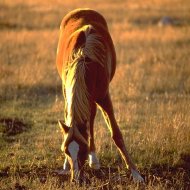"Influx" of atypical myopathy cases

Research has linked toxins in the seeds of sycamore trees to atypical myopathy.
Newmarket vets have seen "an influx" of horses with equine atypical myopathy (AM) and are warning owners to restrict access to sycamore trees, which have been linked to the potentially lethal condition.
Over the past week, Rossdales Equine Hospital says it has seen several cases of the muscle disease, all of which were sycamore related.
Past research suggests AM is likely to be caused by ingestion of sycamore tree seeds, which contain the toxin hypoglycin-A. The condition is thought to be particularly common after periods of wet and windy weather.
Rossdales' internal medicine specialist, Professor Celia Marr, said recent weather conditions are likely to have been "an additional trigger factor."
She added: "We would recommend removing access to sycamore and providing supplementary feed during bad weather - both are appropriate measures."
AM causes the destruction of muscle tissue, including the heart. Dark coloured urine is "a characteristic sign," said Professor Marr. The presenting sign in about 10 to 20 per cent of patients is sudden stiffness or difficulty swallowing.
Other signs include muscle tremors, breathing problems, sudden weakness and low body temperature.
Swift treatment and careful management is essential in AM cases.



 The BSAVA has opened submissions for the BSAVA Clinical Research Abstracts 2026.
The BSAVA has opened submissions for the BSAVA Clinical Research Abstracts 2026.